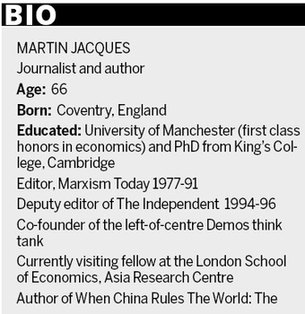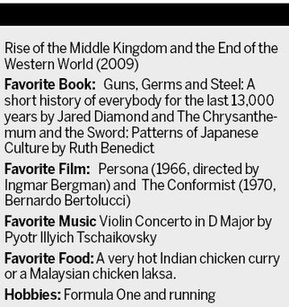I told you so, twice over
Updated: 2012-09-29 10:14
By Andrew Moody (China Daily)
|
||||||||
 |
 |
One of Jacques' biggest frustrations is that many of the critics of the book have never seen beyond the title and in some cases, he believes, have never actually read beyond the title.
"If you take the title literally, it is silly. People think that by reading the title, they have encapsulated the book and that is a profound mistake. Anyone who reads the book will see that it is very carefully considered, scholarly and serious. It is an analytical work that it is not in the least bit glib," he says.
It is, in fact, the case that the book has had its worst reception among some Western China experts but is highly regarded by many Chinese academics, including leading foreign policy experts like Shi Yinhong at Renmin University in Beijing.
Jacques insists there are two central arguments in the book that still hold true.
"One is that the rise of China will mean we will no longer live in a purely Western-shaped world. Really my book was the first to argue this, you know," he says.
"The second is that you cannot understand China in Western terms. You have got to understand the specificity and nature of Chinese culture. China is not like Western society. It is completely different."
Although he has held a number of academic posts in Asia, including in Japan and Singapore, Jacques was perhaps best known before writing the book, as being editor of Marxism Today, which was one of the most successful political magazines in the UK in the 1970s and 1980s read by both left and right, alike.
He went on to be deputy editor of The Independent newspaper and is now a regular contributor to newspapers such as the Financial Times and the New York Times.
When China Rules The World has had a huge impact on his life, partly because he had to complete it while still grieving for his late wife, the Malaysian-born lawyer Harinder Veriah who died as a result of clinical negligence in a Hong Kong hospital, against which he has won a recent legal battle.
"I remember thinking only my closest friends would ever know what finishing the book meant to me and what hell, pain and agony I had been through," he says.
"I have obviously taken a lot of pleasure in the fact the book has had a huge impact and that it has been argued and debated about on a number of different levels."
One thing that has changed since the book was published is that the estimates of 2027 when China would take over from the United States as the world's largest economy no longer seems fanciful. It has already become the second largest, usurping Japan last year.
"I remember someone saying to me in the audience at a talk that it would happen over a much larger time scale or not at all; 2027 now seems like an underestimate. Some are predicting it could be 2018."
Jacques says he is going to continue writing about China and that his next project could be on the relationship between it and India, where he has just been promoting the book.
"I am interested in carrying on writing about China. There are many questions on my mind. I am going to write something on China and India but a book, it is too early to say," he says.
Whatever his next project, however, Jacques, looking unprepossessing for the moment in his running shorts, seems to have made a permanent imprint on the debate on China.
andrewmoody@chinadaily.com.cn

 Relief reaches isolated village
Relief reaches isolated village
 Rainfall poses new threats to quake-hit region
Rainfall poses new threats to quake-hit region
 Funerals begin for Boston bombing victims
Funerals begin for Boston bombing victims
 Quake takeaway from China's Air Force
Quake takeaway from China's Air Force
 Obama celebrates young inventors at science fair
Obama celebrates young inventors at science fair
 Earth Day marked around the world
Earth Day marked around the world
 Volunteer team helping students find sense of normalcy
Volunteer team helping students find sense of normalcy
 Ethnic groups quick to join rescue efforts
Ethnic groups quick to join rescue efforts
Most Viewed
Editor's Picks

|

|

|

|

|

|
Today's Top News
Health new priority for quake zone
Xi meets US top military officer
Japan's boats driven out of Diaoyu
China mulls online shopping legislation
Bird flu death toll rises to 22
Putin appoints new ambassador to China
Japanese ships blocked from Diaoyu Islands
Inspired by Guan, more Chinese pick up golf
US Weekly

|

|






